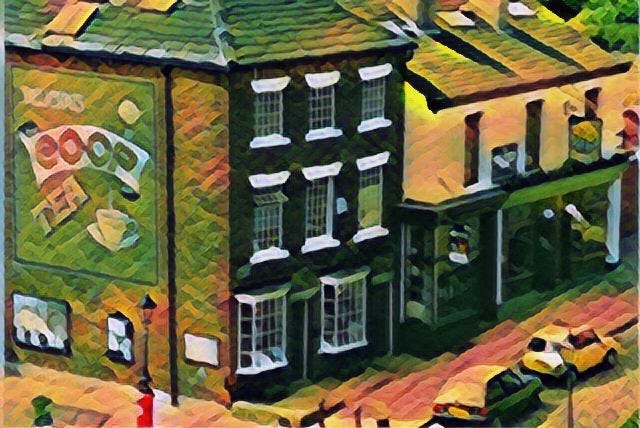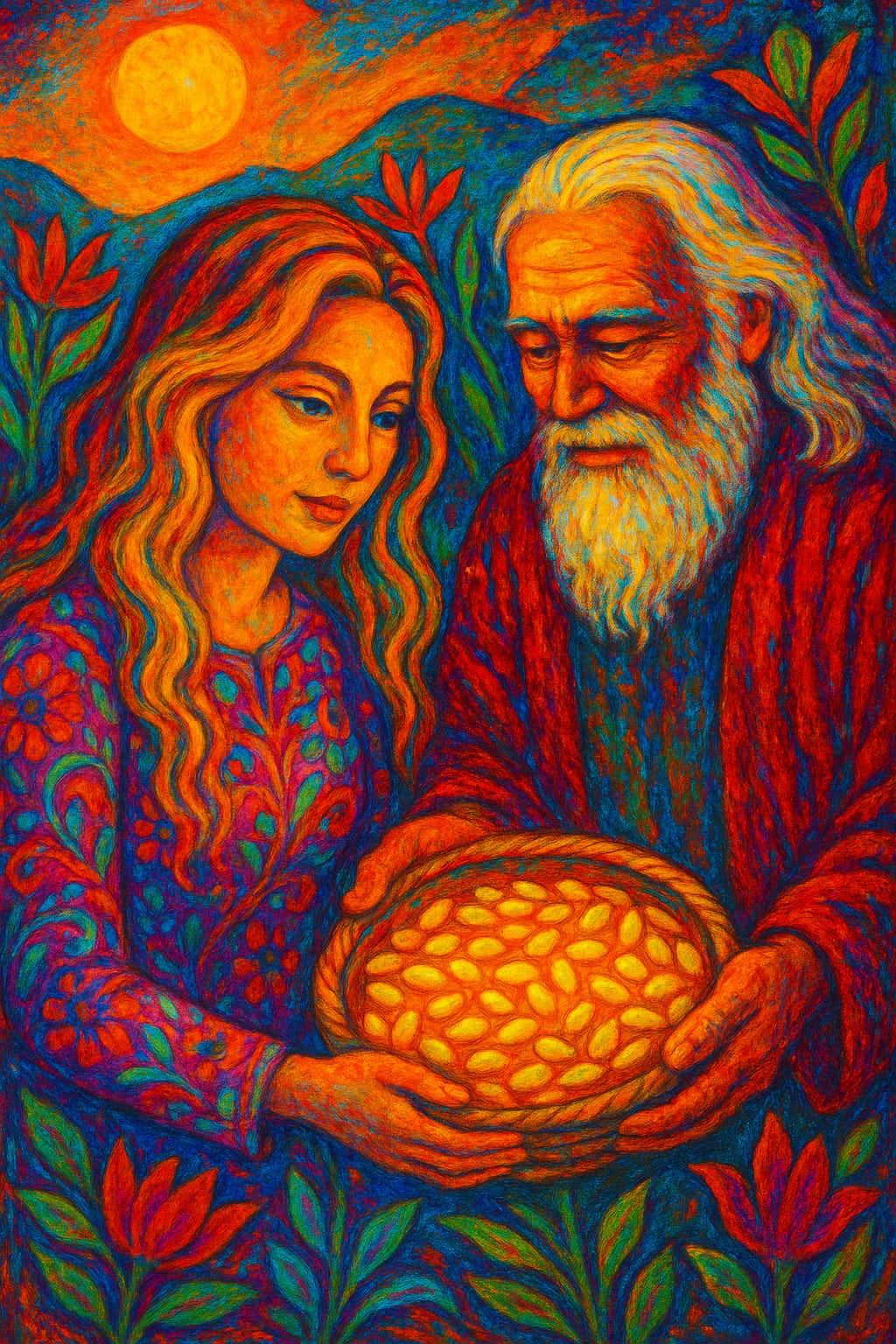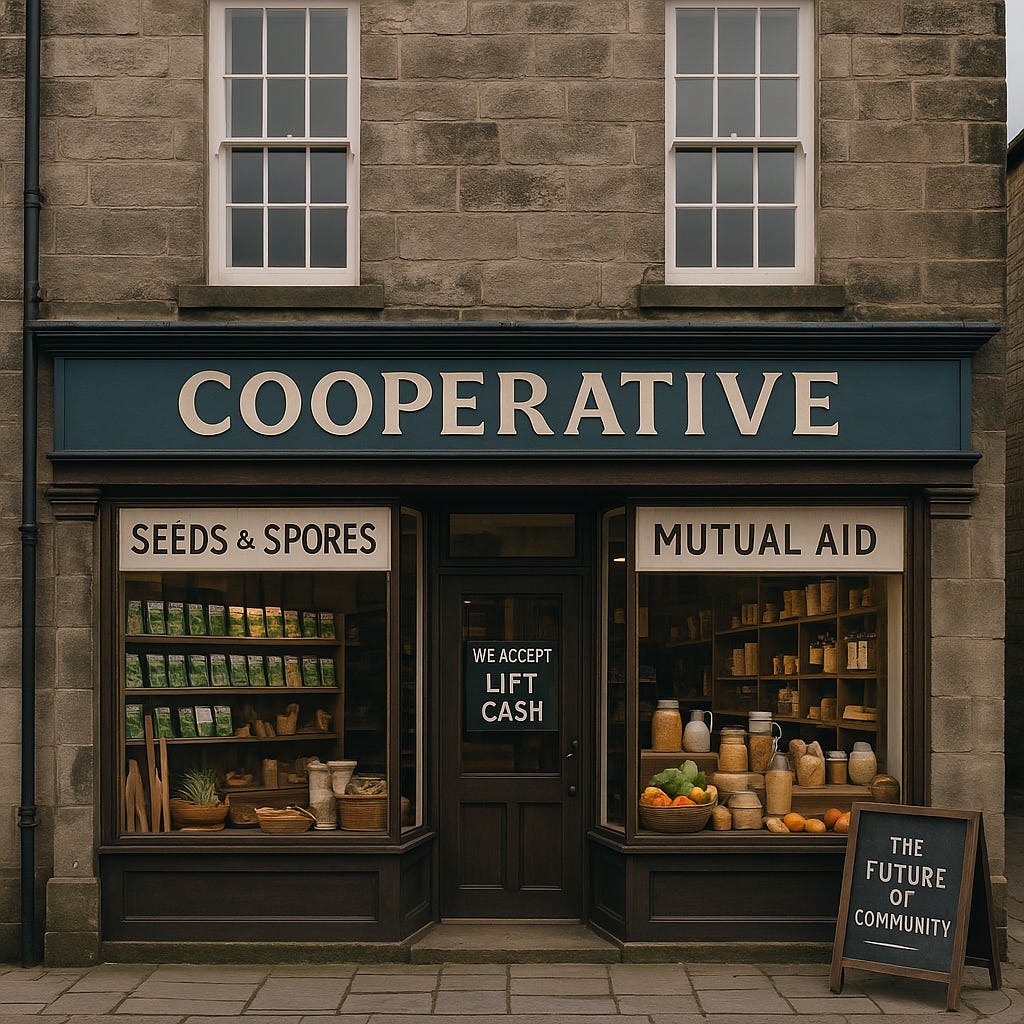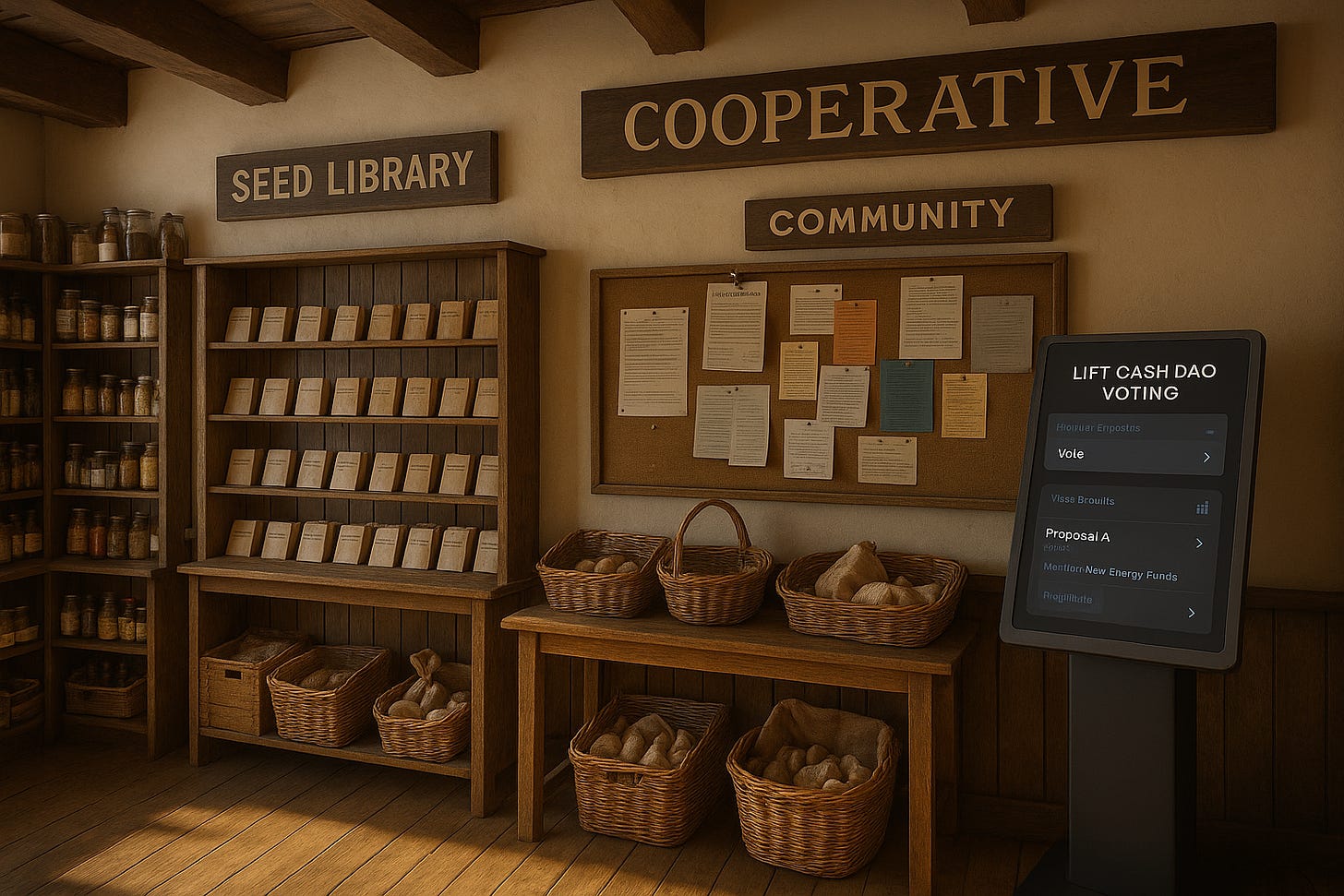Cooperative Societies for Modern Times
Honouring "The Rochdale Papers"
The Modern Rochdale Papers: Reclaiming Community Through Decentralized Cooperation
1. Introduction: Why Rochdale Still Matters
In a time when inequality grows unchecked, when global systems seem designed to extract rather than uplift, it’s worth returning to a small British town where something remarkable began. In 1844, a group of working-class weavers in Rochdale, England, came together to forge a new path—one rooted in mutual support, democratic control, and community ownership.
The result was the world’s first successful cooperative society, and the principles they laid down would form the bedrock of the international cooperative movement.
Today, nearly two centuries later, the challenges we face echo theirs: economic instability, exploitation of labor and natural resources, and a sense of powerlessness in the face of concentrated control. But we also have new tools—distributed ledgers, DAOs, and decentralized identity systems—that offer a chance to renew Rochdale’s legacy in the digital age.
This paper is a proposal to do exactly that: to reawaken the cooperative spirit using modern cryptographic tools and community-governed systems.
We call it The Modern Rochdale Papers.
2. A Brief History of Rochdale and the Cooperative Movement
The Rochdale Society of Equitable Pioneers began in a modest shop at 31 Toad Lane. Their goals were simple but radical: access to fairly priced, unadulterated food and democratic ownership of their means of trade. What set them apart was not just their vision but their principles, which they codified and lived by:
Voluntary and open membership
Democratic member control
Member economic participation
Autonomy and independence
Education, training, and information
Cooperation among cooperatives
Concern for community
These principles spread across Britain, Europe, and eventually the world. Co-ops became viable alternatives to both state-run and privately monopolized systems. But in recent decades, many cooperatives have drifted from their roots, becoming bureaucratic or co-opted by market logics. Large-scale cooperatives—particularly in the finance, agriculture, and retail sectors—have in many cases begun to mirror the very corporations they were meant to offer an alternative to. Decision-making has increasingly become centralized in boards and executive leadership, distancing everyday members from having a real voice. Democratic participation, once a cornerstone of cooperative identity, has often been reduced to token gestures like annual meetings with little effect on strategy or priorities.
This erosion has been driven by external and internal pressures. Externally, globalization and neoliberal economic policy have forced co-ops to compete in profit-driven markets that reward efficiency over equity and scale over sustainability. Internally, the pursuit of growth and competitiveness has led some cooperatives to seek outside capital, restructure as for-profit subsidiaries, or even demutualize entirely. Food cooperatives have raised membership fees and adopted managerial structures modeled on supermarket chains. Credit unions, especially in the U.S., have consolidated and sometimes prioritized investment portfolios over serving local borrowers.
In these shifts, the principles of mutual aid, transparency, and member empowerment have often been sacrificed. Rather than challenging the dominant economic paradigm, many cooperatives have become absorbed into it. This loss of integrity has not gone unnoticed—and it creates a vital opening to return to first principles, not as nostalgia, but as a blueprint for innovation in the 21st century.. Large-scale cooperatives, once founded on democratic ideals, began to mimic corporate hierarchies—centralizing decision-making power and prioritizing financial growth over community well-being. Some credit unions and food co-ops started operating more like traditional banks and supermarkets, losing their participatory structures and transparency. Meanwhile, globalization and neoliberal policies pressured cooperatives to compete in capitalist markets without the protections that once supported local solidarity. As a result, many co-ops began outsourcing labor, reducing member control, or seeking private capital investments—moves that often diluted their founding principles. This erosion of cooperative integrity has created a pressing need to revisit and revitalize the original vision of mutual aid and shared stewardship.
Now, we can begin again.
3. The 21st Century Crisis: Financialization, Disconnection, and the Need for Reweaving
Our era is one of deep financial and social disconnection. Central banks print money into the hands of the few, while billions remain unbanked. Global platforms control identity, wealth, and even speech. Communities are disempowered, and ecological systems are strained to collapse.
Amid this crisis, cooperation—true cooperation—is revolutionary.
We believe the answer lies in reweaving: reconnecting local economies, reestablishing community control over value, and creating tools that are owned by the people who use them. This is where Lift Cash, SNS DAO, and Proof of Personhood come in.
4. Enter Lift Cash and the SNS DAO
Lift Cash is a decentralized digital currency initiative built for local resilience. Unlike speculative crypto tokens, its purpose is to support real communities through peer-to-peer transactions and community-governed treasuries.
It is built on Dfinity’s Internet Computer, a blockchain platform that allows for full-stack web applications running on decentralized infrastructure. At its heart lies the SNS DAO—the Service Nervous System—a protocol-native system for community-led governance.
Here, governance is not a buzzword. It’s structural. Communities can vote on treasury allocation, development priorities, and more—all transparently and on-chain.
To ensure true democracy, Lift Cash uses Decide ID, a privacy-preserving Proof of Personhood (PoP) system. This allows communities to prevent sybil attacks (fake or duplicate identities) while maintaining participant privacy. One person = one voice. Just like in Rochdale.
This vision has been deeply shaped by the work of Miguel and Alexandra, two co-founders of the Bitseed.World initiative. Both have ties to Britain—Miguel by birth, and Alexandra through her time living and studying in the UK. Alexandra was born in Saudi Arabia; her father was Welsh, and she spent many childhood summers visiting family in Wales and England. On those visits, she often encountered cooperative shops and community enterprises, absorbing their ethos long before she had language to describe it.
Miguel, known also as Mike, grew up in the UK surrounded by cooperative businesses—local building societies, food co-ops, and community clubs. Yet at the time, he regarded them as unremarkable, not recognizing the deep philosophical distinction they held from mainstream capitalist structures. It was only later, through conversations with Alexandra and immersion in ecological and decentralized economic movements, that he began to see those early experiences as formative.
Together, Alexandra and Miguel began discussing the roots of real resilience—and realized that nearly all land-based food systems ultimately depend on seeds or spores. And yet, seeds are vastly undervalued in our current economic system, especially open-pollinated or locally saved seeds. Meanwhile, multinational chemical companies like Monsanto, Dow, and Syngenta have aggressively pursued control over the seed supply, patenting genetics, enforcing legal restrictions, and limiting farmer sovereignty.
Alexandra and Miguel began asking: what if we reclaimed seeds not just biologically, but economically and socially? What if communities could hold seeds in common, governed by cooperative principles and DAO structures? What if seeds—these tiny packets of potential—became the basis of a new cooperative economy for the 21st century?
These questions now guide much of their work in Bitseed.World and Lift Cash—bringing seeds, people, and value back into alignment through digital tools rooted in living systems thinking.
One evening, while sitting beneath an old pear tree on a permaculture site they were helping restore, the conversation between Alexandra and Miguel turned reflective.
"I remember visiting a little Welsh town," Alexandra said, sipping tea. "They had this shop—run by everyone, it seemed. I didn’t realize it was a co-op until much later. I just thought it was... friendly. Familiar. And my aunt always spoke of the cooperative dairy as if it were a family heirloom."
Miguel nodded. "It’s funny, I saw them too. Building societies, food co-ops in the neighborhood... but I never gave them a second thought. They felt like just another shop. Not until we started talking about value systems did I see the contrast."
"Isn’t it wild," she said, leaning forward, "that almost everything we eat starts with a seed or a spore—and yet seeds are nearly invisible in economic conversations?"
"Or worse," Miguel added, "they're locked up by corporations. The same companies that sell fertilizer are selling the seeds—controlling both ends of the food chain."
"That’s the lever," Alexandra said. "If we start from seeds, and organize around them using real cooperative models—modernized with DAOs and digital identity—we might just reweave a system that values life again."
"Back to the roots," Miguel smiled. "And forward into something new."
Their vision for Bitseed.World was sealed in that moment—not just a blockchain project, but a movement to re-seed cooperation itself.—bringing seeds, people, and value back into alignment through digital tools rooted in living systems thinking. Both have ties to Britain—Miguel by birth, and Alexandra through her time living and studying in the UK. Their shared roots in permaculture, ecological literacy, and decentralized systems inspired them to look back to Rochdale not just as a historical footnote, but as a call to action. In their work, they see the fusion of tradition and technology as essential to rebuilding trust and community autonomy.
5. Modernizing the Rochdale Principles for the Web3 Age
We now reinterpret the Rochdale Principles using the architecture of Lift Cash and the SNS DAO:
Rochdale Principle 21st Century Equivalent via Lift Cash / SNS DAO Voluntary Membership Open access to DAO participation via PoP Democratic Member Control One person = one vote with Decide ID Member Economic Participation Treasury governance through community tokens Autonomy and Independence Protocols and apps run on decentralized Internet Computer infrastructure Education, Training, and Information Built-in community forums, voting interfaces, and documentation hubs Cooperation Among Cooperatives Cross-DAO and inter-guild alliances using shared governance frameworks Concern for Community Treasury funds allocated to local initiatives: seed banks, food guilds, pollinator reserves
The principles remain—only the medium has changed.
6. A Call to Action: Writing Our Own Papers
These are not just abstract ideas. We are building them now. And we invite you to help. Join us as we:
Launch new local Lift Cash DAOs
Fund permaculture and seed-saving projects through community vote
Connect food growers, technologists, and activists in bioregional alliances
Write and refine these modern Rochdale Papers as living documents
This is your invitation to become a modern-day Pioneer.
7. Conclusion: From Weavers to Web3 – the New Commons Awaits
The Rochdale Pioneers didn’t just sell oats and flour. They wove a new fabric of community.
Today, our loom is the blockchain, our threads are tokens, votes, and values. And our goal remains the same: economic democracy, mutual aid, and resilient, self-determining communities.
Let us pick up the thread.
Let us write The Modern Rochdale Papers—together.
Published by Bitseed.World — Rebuilding the Future, One Block and One Seed at a Time.






